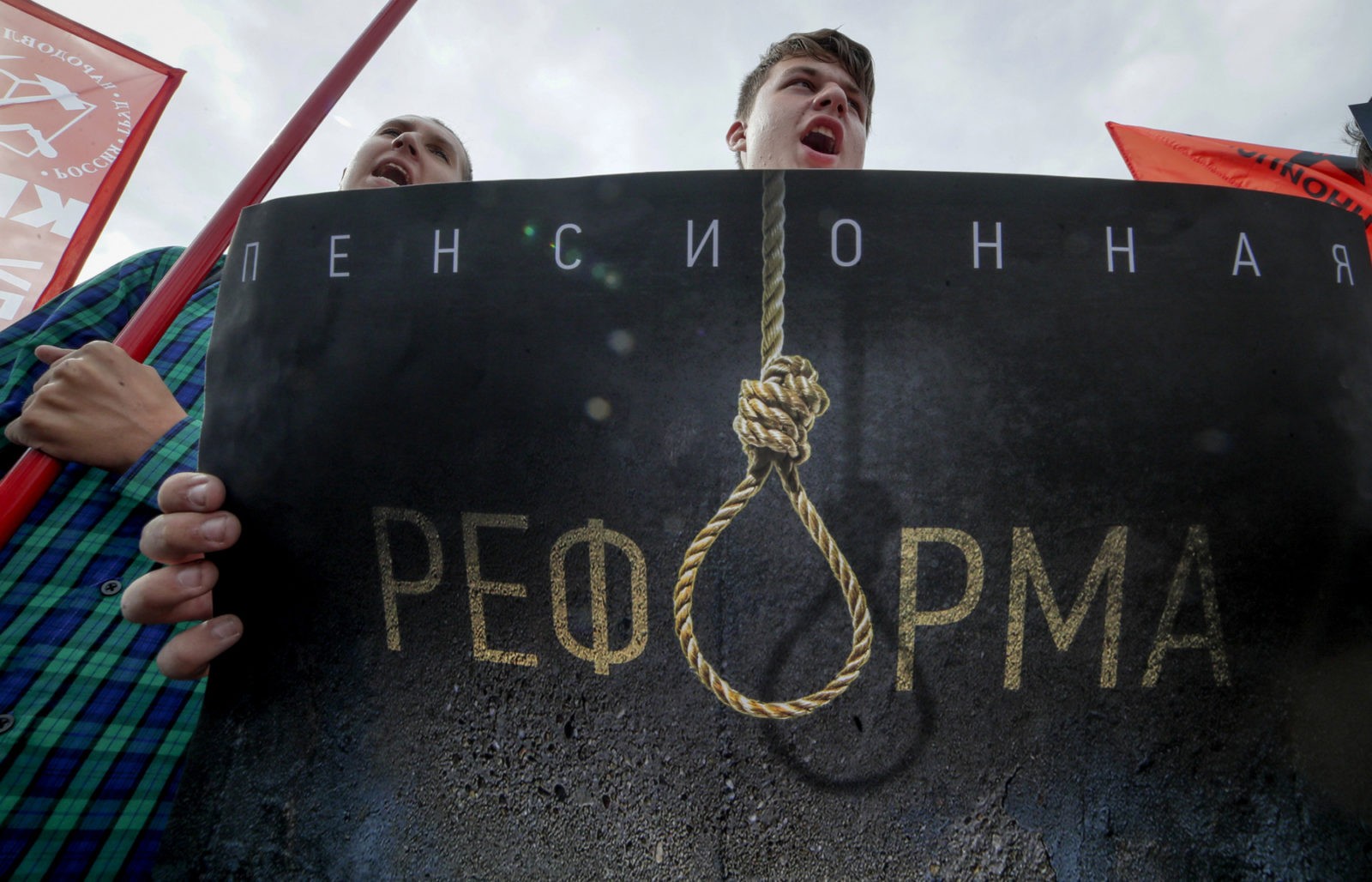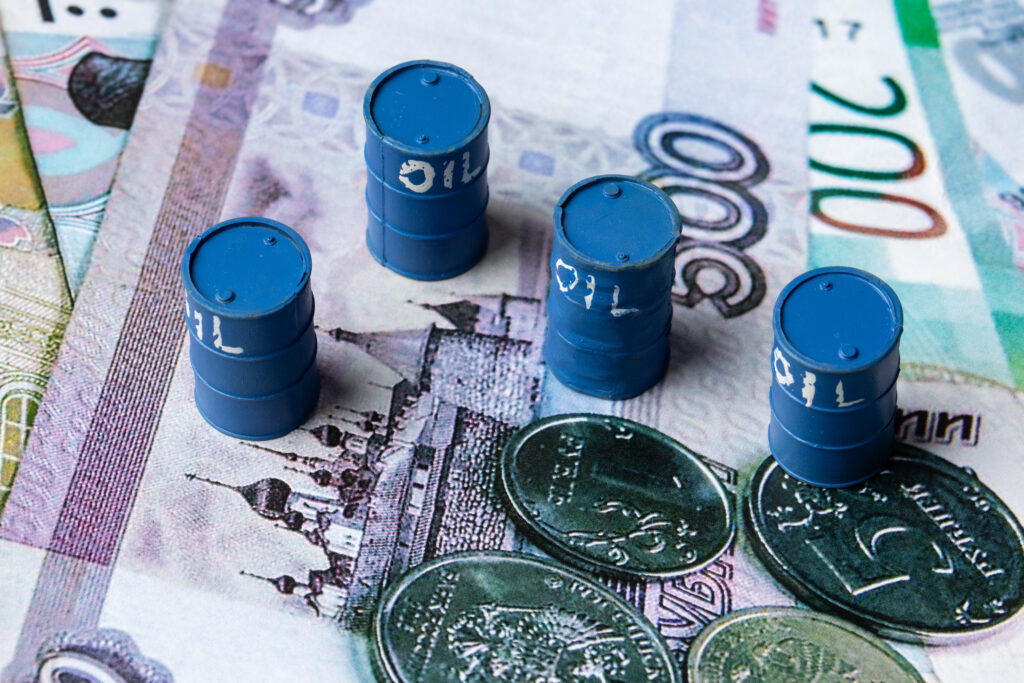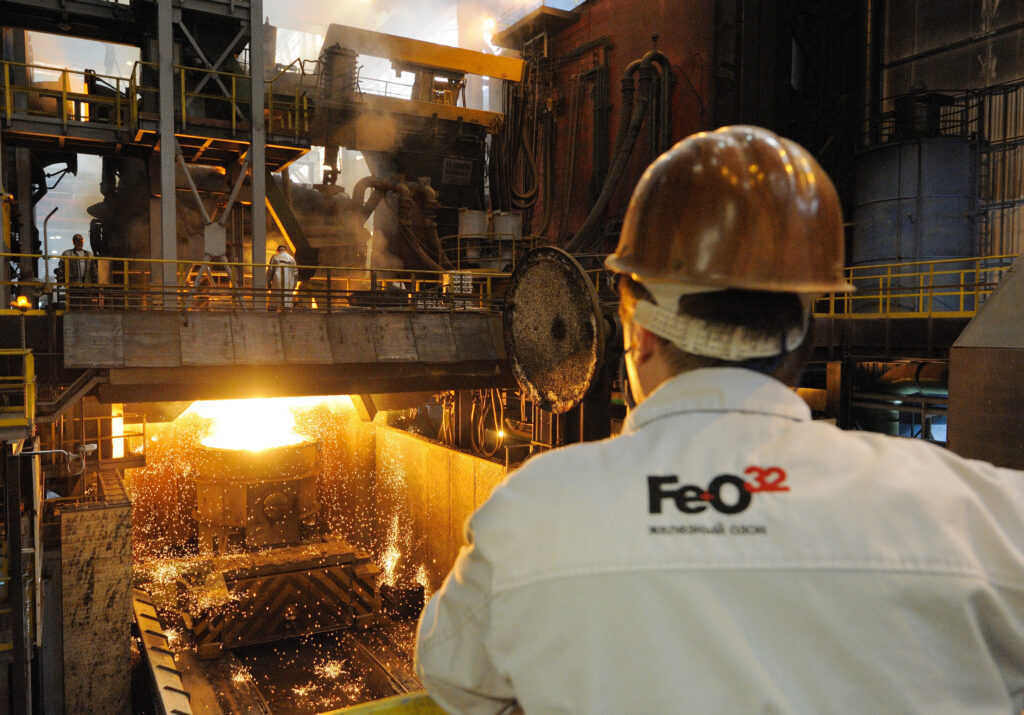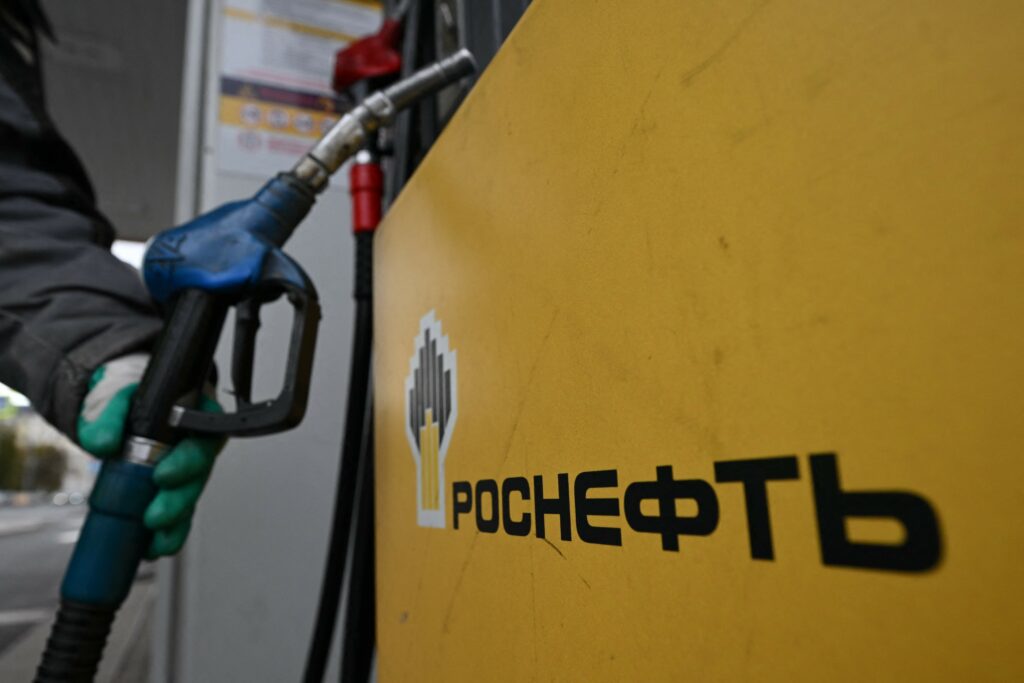Since June, sociologists have recorded growing public dissatisfaction. The cause? A plan to reform pensions. Citizens are unanimous: 90% of Russians oppose the reform. (The last development that united Russians to the same extent was the annexation of Crimea, which triggered positive emotions.) Public approval ratings of the president and the government have both taken a hit. These last two months have seen Vladimir Putin’s approval rating drop from 80% to 70%. It is the steepest ratings drop he has faced in years. Effectively, the president’s approval rating has fallen to a level observed in 2011-2013. That was a time of protests, deferred effects of the economic crisis and a decline in people’s expectations.
On August 29, Vladimir Putin delivered an address on pension reform and suggested certain concessions. These included a reduction of the earlier proposed retirement age for women, and various other perks. Yet the president’s speech broadly in favour of an unpopular pension reform could hardly restore such a previously sky high rating.
Russians are used to the idea that any process is reversible until the president has expressed his opinion. Although the majority of Russians expected the plan to go ahead, there was still some scope for discussion. The parliamentary opposition expressed their disapproval of the reform. And the CPRF is planning to hold a referendum. Focus-group participants used to claim: ‘Putin is not fully acquainted with the new project. He’s keeping silent.’ Russians say the plan’s aim is to protect the money of the state, public officials and oligarchs at the expense of ordinary citizens. Even those who consider the raising of the retirement age inevitable see it as a consequence of ineffective governance. The change is by and large seen as proof of the political elite’s inability to solve the problems the country faces. Russians list an active foreign policy as one of the main reasons for excessive public spending. Most notably, involvement in the wars in Ukraine and Syria, the incorporation of Crimea and ever greater spending on defence. They also mention the insatiable appetites of public officials, and humiliating social stratification. Russians draw a grave picture of the hypothetical consequences of the reform: poverty, decreased life expectancy, a ‘great depression’ and a near-total collapse of morals due to the inability to maintain decent living standards. This is not the opinion of the marginalised opposition, but widespread fears. All this could be enough to prompt demands for a change of the political elite, let alone mass protests. Yet we see no decisive steps by protest leaders, nor a growth of grassroots indignation. Why is this?
What is a pension for?
One convenient concept of the social contract between the state and society implies that the government is obliged to ensure a decent standard of living in exchange for the population’s support. In this case, liability for the failure to fulfil obligations under the contract applies; Russians should perceive pensions as the subject of a contractual relationship. Recent qualitative research by the Levada Centre sheds some light on the issue. The most widespread view is that a pension is compensation for work for the benefit of the state and society, for the common good. Focus-group participants reiterate: a pension is paid in exchange for ‘what was put into the public coffers’. There is also a different point of view, that a pension is a reimbursement of the money contributed by a citizen to the Pension Fund. At first glance, the difference between the two approaches is minor. But, it is fundamental: either a person is contributing to the common good, or they are investing in their personal welfare. In the first case, the state pays a certain social benefit in exchange for loyalty and dedicated work. In the latter case, we are dealing with a personal investment in one’s own future. It seems attitudes are determined by age. Russians aged 30-40 tend to manifest an individualistic approach: ‘Ideally, everyone should earn a pension. I don’t want to provide for anyone. I want to earn my own money’. The proprietary approach to pensions implies that they cannot be inherited or treated as a deposit. You cannot refuse to make mandatory payments to the Pension Fund, and you have to save money for old age on your own.
In turn, Russians over 50 tend to believe that it is the state which should be responsible for paying out pensions. In their opinion, pension levels should link to personal contributions, but pensions also play the role of a social benefit. After all, the social worth of a person is not always determined by their financial standing and the amount of money contributed to public coffers. Ideally, pensions should depend on personal contributions. But there are also abstract notions at stake such as general well-being, and they are at the discretion of the state. Respondents over 50 do not believe that an individual should be fully self-reliant. They see the need for pension payments even if a person worked little or did not pay taxes. Therefore, pensions are seen as a constitutional duty of the state, which should take care of its citizens and provide them with a set base payment. Yet, Russians are used to the state’s constitutional duties changing their form and amounts, without necessarily taking public opinion into account.
There is another factor that affects the social perception of the pension reform. Namely, its generalised nature. Changes in living conditions are best noticed when compared to a reference group, while the national deterioration in living standards is perceived as objective reality. The French thinker Alexis de Tocqueville used to say that a government could do almost anything as long as it treated everyone equally. The Russian authorities did not intend to offer everyone equal conditions under the pension reform. Some strata of society enjoy much better conditions. This is perceived as unfair: ‘The pensions of public officials constitute 70% of their wages. Not to mention the fact that they can retire earlier. How come? Why 70%? It’s twice as much.’ In line with Soviet traditions, the bureaucracy is seen as a stratum of scroungers. Preferential conditions for the military divides the authorities and the people, as in the Soviet Union. In public consciousness, servicemen are at least as the people’s defenders. The militarisation of society in recent years only bolsters this image. Pension preferences enjoyed by the siloviki are unlikely to change the image of the army. But, such selectivity divides the authorities and society at large.
The potential for resistance
Whether this public discontent can lead to mass protests remains an open question. To begin with, a decline in the president’s approval rating is a logical consequence of this unpopular decision. It is unlikely that the initiators of the pension reform expected massive enthusiasm. The decrease in approval ratings is not sufficient to trigger mass unrest, but it will have deferred consequences. One can only repeat the rhetorical question ‘If not Putin, who?’ The lack of an alternative political leader limits shifts in approval or disapproval rates. Russians may remember that yesterday’s Putin was better than today’s Putin. But other politicians cannot compete with him. Time in fact may be on Putin’s side. His approval rating have rising from its lowest point of the summer. An opinion poll conducted before his address on pension reform had him rise from 67% to 70%. Indeed, the incorporation of Crimea is remembered today not only with admiration but also with a grin. Few recall the 2005 protests related to the replacement of benefit allowances with direct payments.
Secondly, it is doubtful whether a strong opposition will emerge. Aleksey Navalny has released fresh materials and announced a rally on September 9 (on a scheduled election day). He can hardly be called a spokesman on the issue of the pension reform though. As a rule, left-wing parties and politicians voice the interests and concerns of society on social reforms. However, neither the CPRF nor the Left Front played an important role in recent rallies: their protest went largely unnoticed, delivering no results. The presidential concessions on pension reform may pull the rug out from under the opposition. Remember the Moscow housing renovation initiative: In May 2017, when the program was just announced, a group of activists was able to organise several rallies with thousands of protesters participating. By September, in the aftermath of concessions on behalf of the mayor’s office and a large-scale information campaign, the protests had come to a halt. Most probably, the rallies did lead to a mitigation of the conditions of the renovation. Expected protests can also play a key role in the run-up to the implementation of the pension reform. According to opinion polls, society’s expectation of protests rose from 17% to 41%, and more than 50% of respondents are ready to protest against the reform. As a rule, protest expectations are growing in the aftermath of important public actions. The current bounce in this indicator is rather indicative of growing pressure, which has not yet surfaced. This may affect the intentions of the state authorities, and make them more cautious. The potential protest milieu comprises people of pre-retirement age. Approval of the reform is low in all age groups, but the problem is most acute among those who will be the first to suffer its consequences. Young people are expected to adapt to changes in the pension system.
What decision will be made by President Vladimir Putin on the bill on raising the retirement age?

Finally, one factor that could bring the president’s approval rating down very soon is unfulfilled public expectations. July opinion polls indicate that approval of the president’s actions is related to the decisions expected of him. The proportion of those who expect him to sign and enact the law is much lower among Putin’s supporters (Putin’s approval rating was 67% in July); 18% of respondents who approve of Putin’s decisions expect him to reject the law. Disappointment may increase the number of his critics by 5-10 percentage points. Although there is no chance that the pension reform will be terminated, further concessions and revisions may satisfy most Putin supporters. It is already obvious that there will be no dramatic change in the political situation of the country, while the savings due to the higher retirement age can serve as a safety cushion and will extend the period of relative stability. It may well be that this is not going to be the only unpopular decision whose consequences will be mitigated by Putin’s popularity. The president’s ‘virtual’ approval rating has acquired a tangible economic dimension.









